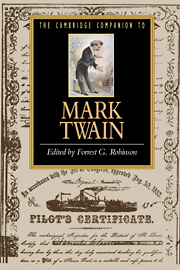Book contents
- Frontmatter
- 1 Mark Twain as an American Icon
- 2 The Innocent at Large
- 3 Mark Twain and Women
- 4 Mark Twain's Civil War
- 5 Banned in Concord
- 6 Black Critics and Mark Twain
- 7 Mr. Clemens and Jim Crow
- 8 Speech Acts and Social Action
- 9 How the Boss Played the Game
- 10 Mark Twain's Travels in the Racial Occult
- 11 Mark Twain's Theology
- Further Reading
- Index
- Continued Series List
2 - The Innocent at Large
Mark Twain's Travel Writing
Published online by Cambridge University Press: 28 May 2006
- Frontmatter
- 1 Mark Twain as an American Icon
- 2 The Innocent at Large
- 3 Mark Twain and Women
- 4 Mark Twain's Civil War
- 5 Banned in Concord
- 6 Black Critics and Mark Twain
- 7 Mr. Clemens and Jim Crow
- 8 Speech Acts and Social Action
- 9 How the Boss Played the Game
- 10 Mark Twain's Travels in the Racial Occult
- 11 Mark Twain's Theology
- Further Reading
- Index
- Continued Series List
Summary
Mark Twain was far and away the most successful travel writer of his time. Innocents Abroad, published in 1869, sold 67,000 copies in its first twelve months in print, reached about 100,000 a year later, and established its author as the nation's premier humorist. Roughing It, which appeared in 1872, was a triumph of only slightly less gaudy proportions. His reputation firmly established, Mark Twain enjoyed continued success with “Old Times on the Mississippi” (1875), A Tramp Abroad (1880), Life on the Mississippi (1883), and Following the Equator (1897).
Travel writing well suited the humorist, Richard Bridgman observes, because it freed him “to use his special literary gifts . . . short bursts of pointed observations, anecdotes, episodes, and tales. He could examine the diversity of the world without worrying overmuch about such matters as consistency or transitions.” Thanks to “the sequence of the journey itself,” the narratives have “at least a simulacrum of coherence.” Otherwise they are notably weak in structure. This defect, Bridgman goes on, is the outward manifestation of Mark Twain's groping, usually unresolved meditations on “a world whose ostensible order remained tantalizingly elusive for him.” Still, the humorist's digressions can be “importantly revealing” as a guide to “the hidden transactions that the intuition conducts with the “unconscious.”
- Type
- Chapter
- Information
- The Cambridge Companion to Mark Twain , pp. 27 - 51Publisher: Cambridge University PressPrint publication year: 1995
- 1
- Cited by



